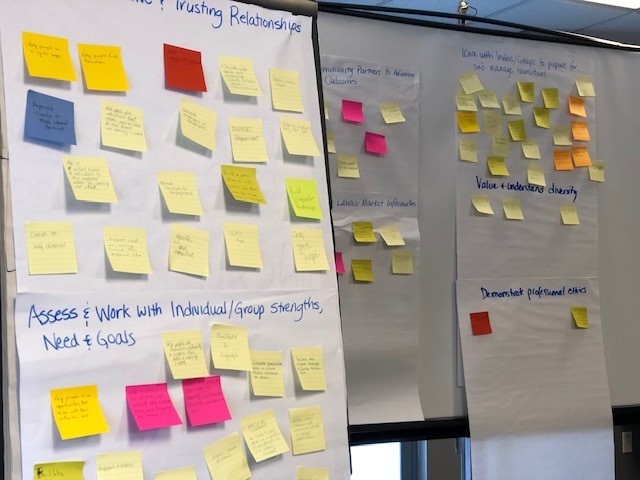Together, we can develop a strong evidence base.

CCDF believes that who you directly involve in the research has a lot to do with how well the findings are implemented into practice. CCDF’s research projects are conducted in partnership with front-line practitioners working with real clients and/or directly with people who are the subject of the research. Our research protocols have been consistently guided by the following principles:
- New interventions/programs/service delivery models must reflect front-line realities and practices or they will never be adopted into longer-term practice, regardless of results;
- Full engagement and buy in of research partners is essential. This includes front-line practitioners, their clients, their supervisors and management in career service settings. In education settings, this includes students and those that have left school prior to graduation, teachers, guidance counsellors, principals, government officials, employers, and community members. We are mindful in any research project to actively seek out and include under-represented voices;
- Involvement in a research project is a professional and organizational development opportunity that benefits clients, professionals, educators and management and supervisors.

Working with those on the front-lines results in outcomes that are grounded in reality and informs practice moving forward.
Our research

Transitioning from Public School to Post-Secondary Education in the Atlantic Region: Issues, Challenges and Approaches to Support Success
Key Researchers:
This report extends Future in Focus by examining current strengths and gaps in the systems supporting public to post-secondary transitions. Based on existing Atlantic assets and opportunities and national/international best practice, clear and concrete recommendations to strengthen post-secondary uptake, retention and successful student transition beyond post-secondary to the labour market were articulated.
Addressing the Catch 22: RBC Career Launch Applicants Recommendations for Improving School-to-Work Transitions
Key Researchers:
CCDF was commissioned by RBC to conduct an analysis of applications to its Career Launch Program for the first three years of its operation. The research within the report is based on a random sample of approximately 5,800 applications submitted during the three years that the RBC Career Launch Program has been accepting new graduates into paid internship positions. The applications received from recent post-secondary graduates (24 years old or younger) provided data on applicants’ education, work and volunteer history and, in the essay portion of the application, their perspectives on what can be done to improve school-to-work transitions in Canada.
Improving the School-to-Work Transitions of Youth in Canada: A Scoping Review
Key Researchers:
The Canadian Career Development Foundation (CCDF) undertook this scoping review to examine how to support better school-to-work transitions for youth – those who had left school prior to graduation, who went directly to the labour market after high school graduation and those who had graduated from a PSE program. The main objectives of this project were to identify what is needed to improve school-to-work transitions of Canadian youth and identify research/programming/policy gaps for future project considerations.
Through this project, CCDF’s undertook four main methods of inquiry to build this scoping review:
The formation of a 12-member cross-sectoral Advisory Committee (AC) of key stakeholder representatives who advised both on the development of the project and provided input on the research, potential hypotheses, literature sources, and key informant contacts;
A literature scan of Canadian and international research related to school-to-work transitions (Literature Scan);
A survey of stakeholders (n=141) to identify the main factors contributing to poor school-to-work transitions of Canadian youth, promising practice and the identification of champions working to create bridges for better transitions for a range of youth (Survey Report); and
Interviews of 11 key informants that served as a final check on the findings from the other methods of inquiry listed above (Key Informant Interview Report).
Career Education in Atlantic Canada: Research and Recommendations
Key Researchers:
CCDF conducted research and provided recommendations on the socio-economic imperatives for action in the area of career development, an environmental scan of successful programs in Atlantic Canada, and a compilation of international best practices. From this research CCDF developed recommendations that we integrated into CAMET’s Future in Focus – Atlantic Career Development Framework for Public Education.
Transitioning Graduates to Work: Improving the Labour Market Success of Poorly Integrated New Entrants (PINEs) in Canada
Key Researchers:
This research report focuses on a growing group of un- and underemployed youth, Poorly Integrated New Entrants (PINEs). PINEs are young people who often have qualifications (diplomas or degrees); but who frequently go back and forth between temporary jobs, unemployment and/or inactivity, even during periods of strong economic growth (OECD, 2010). The report examines what the literature says about them and their barriers to labour market attachment from a global and Canadian perspective. It investigates what works in terms of policies and programs to mitigate their growth, includes a preliminary inventory of national and international programs and policies that target those who are or who are at-risk of becoming PINEs and, finally, provides an analysis of the inventory leading to the development of policy and program recommendations to stem the growth of PINEs in Canada.






